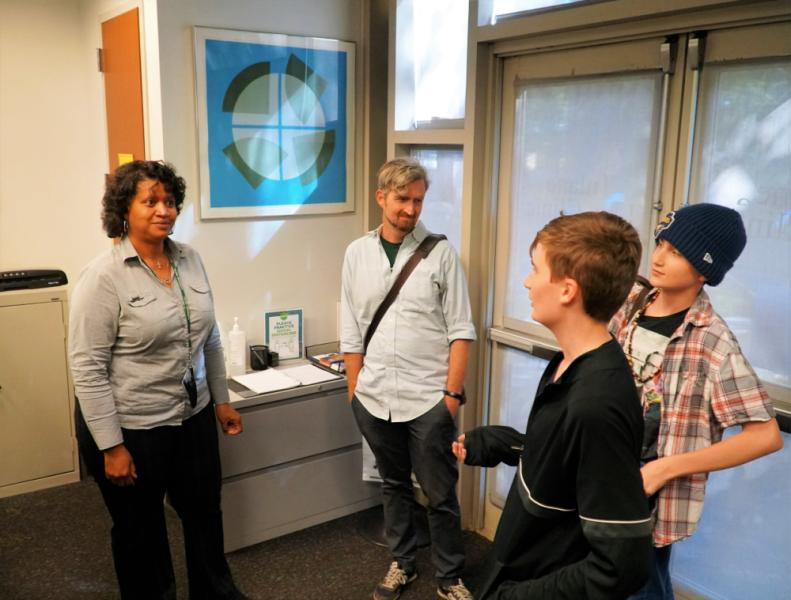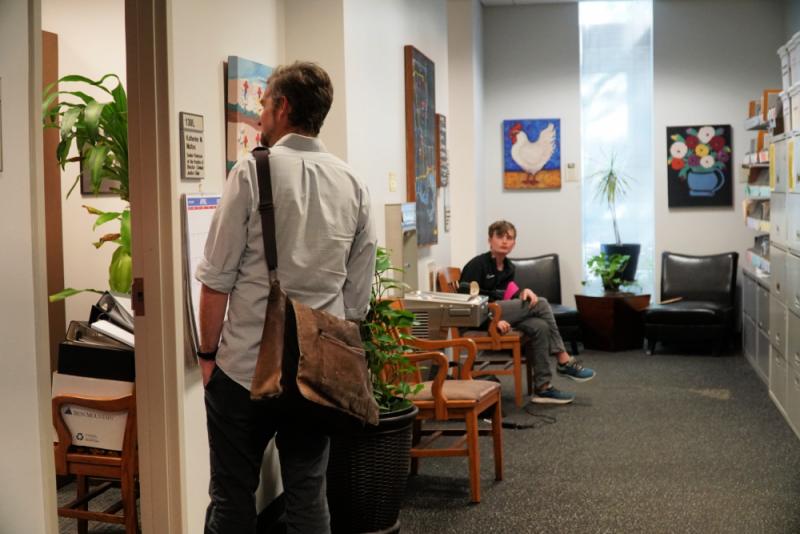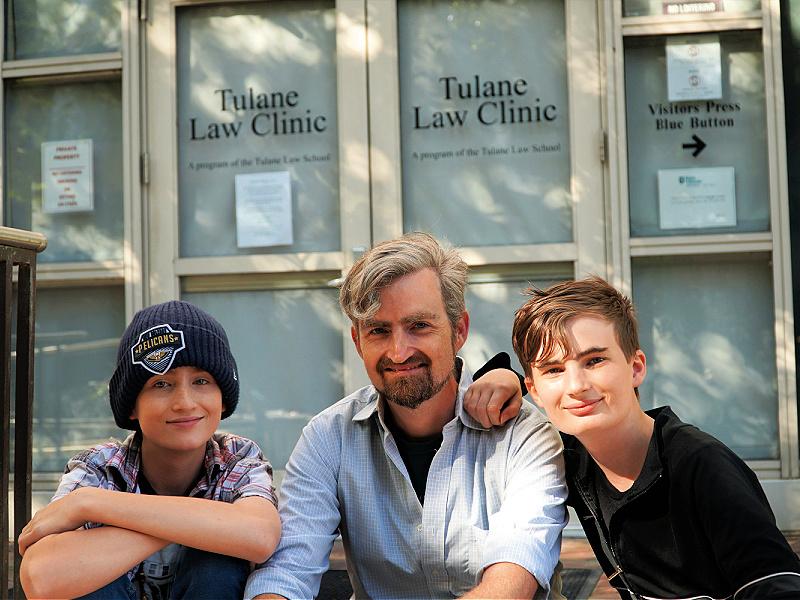Tulane Law Dad, twin boys got through law school together
Taking a risk mid-career to go to law school, Robert Morris, single dad, journalist and passionate advocate for the disadvantaged thought his hardest days ahead would likely be balancing the responsibilities of raising twin teenage boys with his legal studies.
That was the fall of 2019. By spring, the fast-spreading COVID-19 pandemic sent everyone to work and learn in their homes, Tulane Law School’s 200-plus first-year law students along with them.
“We all just hung in there, with the boys and I doing classes online, and we all did a lot of studying outside,” said Morris, who graduates Saturday in the law school’s 171st graduation ceremonies.
“People ask me how I did it with two kids, but I honestly don’t know how I would have done it without them.”
Morris, and 15-year-old twins Ashton and Alex, have done most of the three years of law school together since 2019. While the pandemic forced everyone in law school to go remote, the Class of 2022 was just starting their law studies and spent more time online than any other recent class. Everyone returned to fully in-person classes last fall.
While it changed the delivery of law school, Morris recalls there were as many things that brought him and his boys together during that time.
When the law school started running some fun online events after hours, like “Baking for Non-Bakers” and “Mindfulness with Prof. Keith Werhan” or “Epicurean Adventures – Cocktails, Mocktails and Appetizers” with Profs. Ron Scalise and Sally Richardson,” the boys were front and center.
“We ran around and got all the ingredients to make Blondies with the Dean and Prof. Gajda, and they met Samantha, Prof. Scalise and Richardson’s daughter,” said Morris. “ We made mocktails and bread sticks – they loved that. It was a little bit of an introduction to the people who were part of my law school life. It’s also when people started to notice my kids and they became more of a presence.”

school, staff like Lori Garrett (left) got to know them.
The “fun” stuff was just the beginning. Before long, the boys were finishing their own studies and tuning into Dad’s online. Morris, who has pursued public interest law, was taking classes in criminal law, procedure, constitutional law, and more. In the spring of 2021, Trial Advocacy was mostly online, which piqued Alex’s interest. Students in the course learn courtroom skills and procedures, culminating in teams of students taking a case to trial, with alumni serving as judges.
“Alex watched a whole trial from start to finish, and he just became fascinated by it to the point that one day at dinner he had a discussion with his grandparents about evidence and what was and wasn’t admissible in court,” said Morris.
The boys followed the lessons of Professor Jancy Hoeffel, who teaches criminal law, and Prof. Herb Larson who teaches federal criminal procedure. Hoeffel loved the boys' curiosity.
“I consider it high praise that my classes on Zoom were interesting enough to capture the attention of Robert’s boys during the pandemic," said Hoeffel. "Robert would often repeat to me their insightful and sometimes humorous commentary on criminal law and procedure. Of course, I would expect nothing less than brilliance from his offspring. Robert is a gem. A quiet storm of passion, wit and ingenuity.”
And then there was a particularly memorable class taught by Prof. Robert Westley where he mentioned Marvel’s Black Panther movie, which happens to be Ashton’s favorite.
“Well, Ash wanted to know more about what Westley said, so soon I was shuttling questions and answers back and forth between them,” recalled Morris. “Prof. Westley was so cool about my kids – one of the warmest professors here.”
And, so, for most of his time in law school, the boys were as interested in legal theories as their father.
“One day after class they were like, ‘we learn so much from your classes,’ ” said Morris. “I thought it was great because I saw that they were gaining the confidence to be thoughtful over some really tough problems.”
Alex, who attends Ben Franklin High School, this year tried out and made the high school’s Mock Trial team. He thinks he might pursue a law career someday.
Ashton is the creative of the two. He’s in theater arts at Lusher High School, and he mostly loves chatting up the faculty and staff at Tulane. This year, since their father is a student-attorney in the Criminal Justice Clinic, working under the supervision of Prof. Katherine Mattes, the boys sometimes tag along to the clinic offices. Most everyone there knows the ins- and -outs of their high school adventures.
With graduation just a few days away, Morris is taking stock of the past three years of law school. He studied and took his LSAT while his father was in hospice, a difficult time no matter how much he wanted law school. As the founder of the Uptown Messenger, he decided it was time to move on and allow others to run the online news magazine. It was a risk, but one he says was driven by the very social concerns he wrote about as a journalist.

Years before moving to New Orleans, Morris had worked in Terrebonne Parish, covering the courts. He was fascinated by criminal procedure and law. He saw then- Tulane Law Professor Tania Tetlow, a sex-crimes and domestic violence expert who went on to become the first lay president of Loyola University New Orleans, help reform the New Orleans Police Department’s handling of rape cases. But it was Louisiana’s non-unanimous jury movement that sent him to law school.
“I saw the criminal legal system up close,” he said. “I saw Tania Tetlow making a difference with the rape squad. But the non-unanimous juries convicting on 10-2 votes, that pushed me over the edge. I wanted to be on the front line of change.”
Louisiana’s non-unanimous jury system took decades to overhaul. Ask any defense attorney in Louisiana, and they likely have filed motions citing the unconstitutionality of 10-2 jury verdicts. In 2018, Louisiana voters approved a constitutional amendment that changed the system, but there are thousands still lingering in prison convicted on 10-2 decisions.
“As a reporter, you’re able to tell a person’s story for the benefit of society. Now, I get to tell a person’s story specifically on their behalf, to help that person,” said Morris.
His passion would be to one day practice capital appellate work, some of the hardest public interest cases to address.
“I’m really motivated by that,” said Morris, who worked summer internships during law school at the Innocence Project New Orleans and the Capital Appeals Project. And during the academic year, he found time to work on the Tulane Law Review, Vol. 96.
In the meantime, he and the boys will be relishing their final days at Tulane Law School. And while he knows life again will change after graduation, he is pleased his boys saw an amazing community example here, he said.
“In each semester, I met another professor and another professor who inspired me,” said Morris. “Some of the best people I’ve ever met are at this law school – not just because they care about the law, but because they are truly kind, generous people. I hope my kids seek out a community like that, one that cares about people and cares for one another.”

